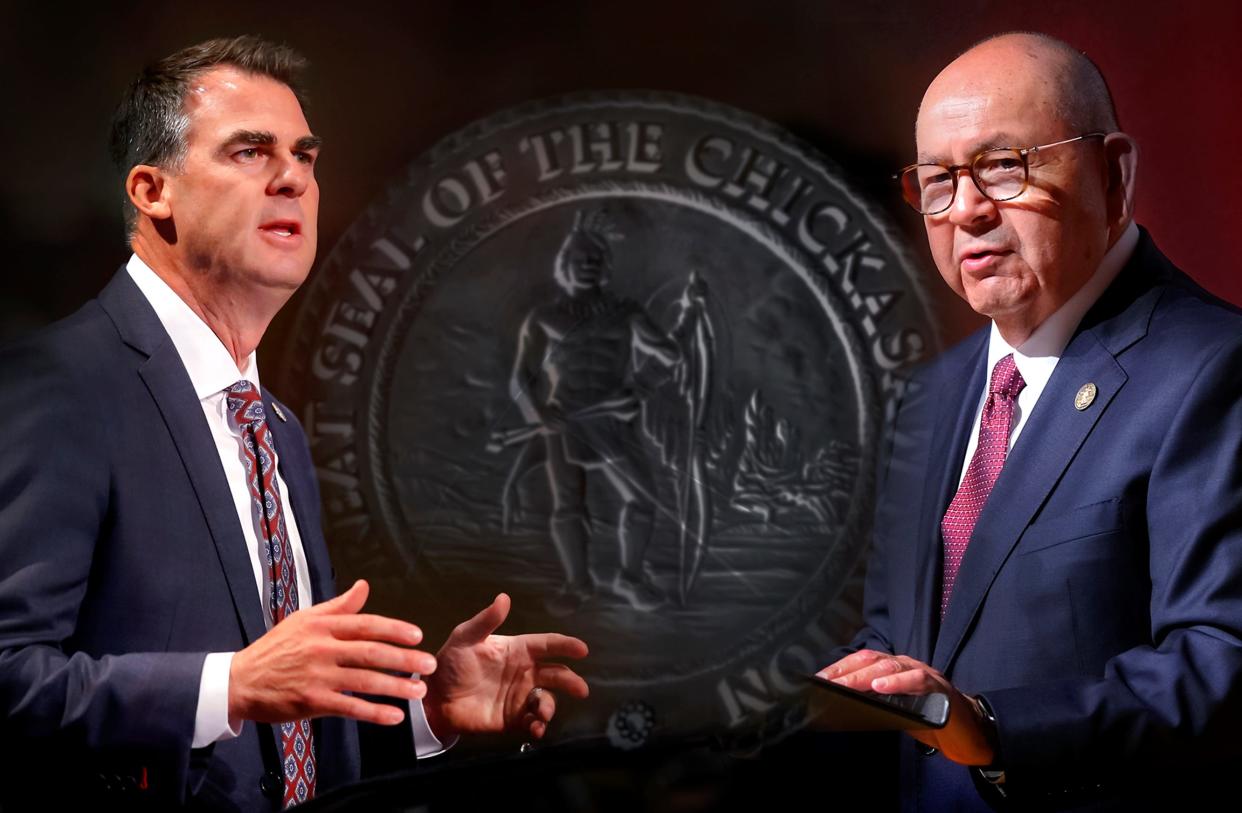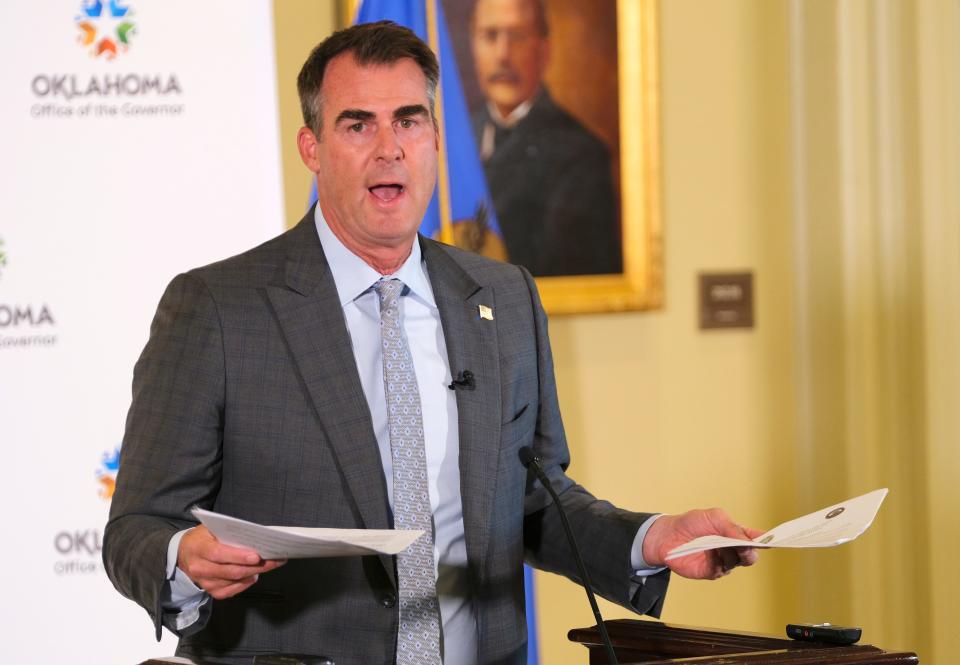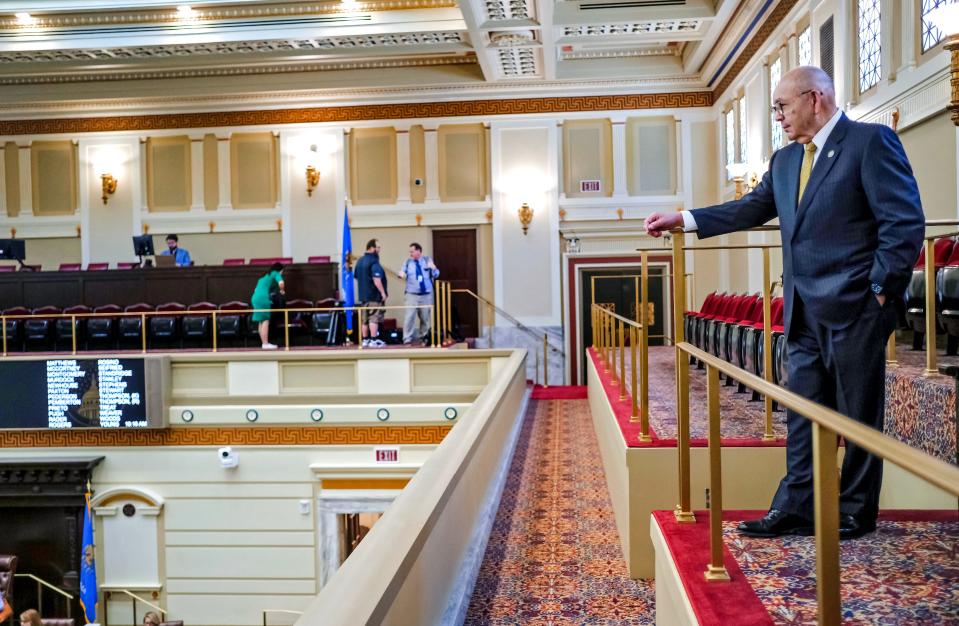Oklahoma's governor just signed three compacts with tribes. He has many more to go

- Oops!Something went wrong.Please try again later.
Top Oklahoma lawmakers say new state-tribal compacts negotiated by the governor are welcome signs of progress.
But many more agreements still need to be worked out by the end of the year, and it remains to be seen whether the Legislature will further intervene.
Gov. Kevin Stitt signed off this month on tobacco tax deals with the Chickasaw and Apache nations. He also reached a separate car tag compact with the Chickasaw Nation.
The deals became an instant highlight in tribal relations under the governor, since he is more often feuding with tribal leaders in court or in public comments. His office has not returned messages to comment on the compacts or disclose how many others being negotiated. However, the governor did issue a statement late Monday confirming he had signed the compacts.
"I continue to welcome other federally recognized tribes in Oklahoma to engage with my office in the compacting process," he said.

Senate President Pro Tem Greg Treat called the new compacts with the Chickasaw Nation a “major win” that will generate millions of dollars in tax revenues every year.
“This is a step in the right direction and something I hope we can build on moving forward while fostering positive relationships with our tribal partners,” Treat said in a statement.
But the Oklahoma City Republican added that he didn’t think the deals would have been possible if the Legislature hadn’t stepped in last year when negotiations between tribal leaders and the governor stalled. At that time, lawmakers voted to renew all state-tribal tobacco tax and car tag compacts on existing terms through 2024.
Other tribal compacts remain to be negotiated, and may go through legal fight
While the Chickasaw and Apache nations now have long term deals, the clock is still running on other tobacco tax and car tag agreements.
A looming court ruling is adding to the uncertainty. Stitt has asked the state’s highest civil court to invalidate all of the compact extensions approved by the Legislature. The state Supreme Court heard arguments in the case in December but hasn’t handed down its decision.
Treat had said last summer he hoped the governor would make headway on compact negotiations with tribes, pledging to take over the job in the Legislature if not. House Speaker Charles McCall also has expressed support for lawmakers asserting a greater role in compact talks.
McCall, a Republican from Atoka, said he was pleased to see Stitt come to terms with Bill Anoatubby, the governor of the Chickasaw Nation.
“I applaud the hard work of all involved in this process,” McCall said in a statement.
The basic terms of the new tobacco tax deals are much the same as before. Under the agreements, the state and tribes agree to split tax revenue from tobacco products sold on tribal land.
More: Another Oklahoma tribe offering food assistance for children after state opts out
Stitt had pushed back against renewing any of those agreements for months, and in some cases years, over his opposition to tribal reservations in eastern Oklahoma. He has insisted on making it clear the terms do not apply throughout entire reservations, only to much smaller subsets of land.
The Chickasaw Nation’s new compact covers the types of land Stitt had proposed. But it does not limit the tribe from selling on other parts of its southern Oklahoma reservation.

“We built on areas of agreement without waiving or limiting the rights of either party or requiring either party to yield on matters where there may still be legal dispute,” Anoatubby said in a statement.
The 2020 Supreme Court ruling that led to the recognition of the Chickasaw reservation does not apply to the Apache Tribe in western Oklahoma, so land definitions were not contentious in its compact talks with the governor, said the tribe’s attorney, Klint Cowan.
The biggest priority for the small tribe based in Anadarko was resuming tobacco sales as a way to generate revenue. Its prior compact had lapsed, Cowan said. The terms of the new compact, signed in early January, do not limit the number of smoke shops the tribe can operate.
“The tribe doesn’t have a lot of revenue generators now,” Cowan said.
What other tribal compacts remain?
It’s unclear how many other agreements are being negotiated by the governor. About two dozen are on track to expire Dec. 31.
More: Tribes keep opting out of Oklahoma governor's reservation task force, calling it flawed
The Cherokee Nation, the largest tribe in the state, has not yet reached any deals with Stitt’s office, said Chad Harsha, attorney general for the northeast Oklahoma tribe.
“The Cherokee Nation respects the rights of our fellow tribes to exercise their sovereignty in compact negotiations with state leadership,” Harsha said in a statement. “In turn, we take seriously our responsibility to support solutions that best serve both our citizens and our fellow Oklahomans.”
Gary Batton, the chief of the Choctaw Nation, said his southern Oklahoma tribe hoped to come to terms soon on compact agreements with the state, “although differences remain on important details.”
“The Choctaw Nation continues to believe we can reach agreements to benefit our members, as well as the state,” Batton said in a statement. “When legislative and executive officials negotiate with our sovereign nation as equal partners, all of Oklahoma’s citizens reap the benefits.”
Molly Young covers Indigenous affairs. Reach her at mollyyoung@gannett.com or 405-347-3534.
This article originally appeared on Oklahoman: New Oklahoma tribal compacts are signs of progress, lawmakers say

